Third time making the same election mistake
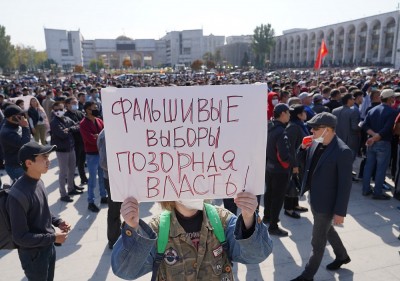
Kyrgyzstani people overthrew the government for the third time because of fraudulent elections. Vote-buying and administrative pressure, constantly accompanying all elections in Kyrgyzstan, played a decisive role this time as well. Whether this will be a lesson for the political elite and power groups is highly questionable.
In an article titled "All parties do it..." dated August 28, 2020, (http://www.nlkg.kg/ru/politics/elections-2020/vse-partii-delayut-eto) we already wrote about how the suspension of the election process in Kyrgyzstan due to the COVID-19 pandemic exposed a long-standing problem such as vote-buying. Political parties have started to massively distribute humanitarian aid to Kyrgyzstanis, thus, according to some experts, violating the constitutional law of the Kyrgyz Republic "On Elections of the President of the Kyrgyz Republic and Deputies of the Jogorku Kenesh of the Kyrgyz Republic" and the Law of the Kyrgyz Republic "On Elections of Deputies of Local Councils". Such a violation occurs during all elections and negates the very idea of holding a fair popular vote.
Parliamentary elections were held in Kyrgyzstan on October 4, 2020. 16 political parties ran for the Jogorku Kenesh of the Kyrgyz Republic, of which, according to experts, five were pro-government, while the rest positioned themselves in varying degrees in opposition to the current regime.
Observers, party representatives, and ordinary voters began to register mass violations from the very beginning of the election race.
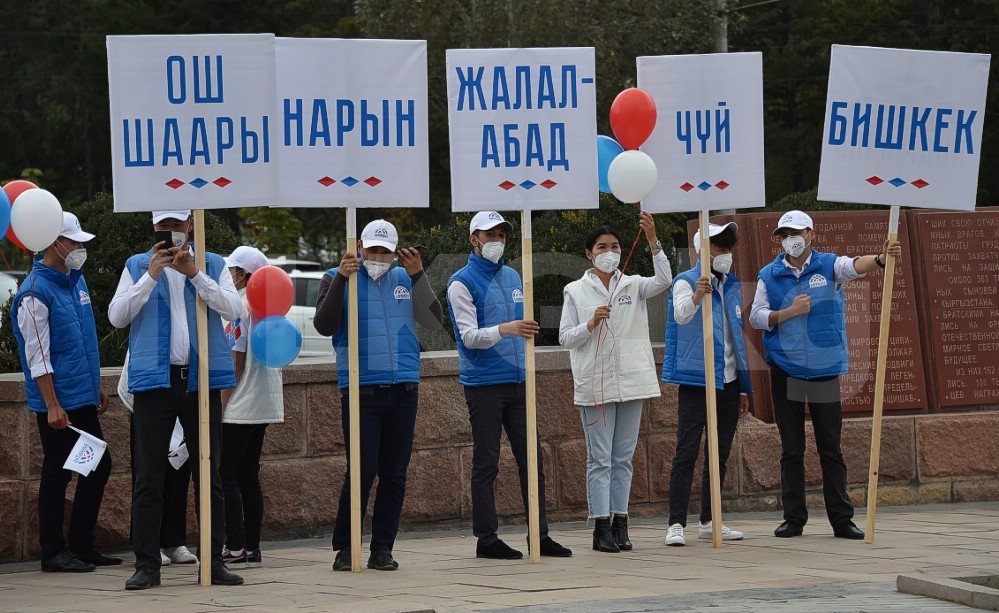
Form No. 2 and its cancellation - will the vote-buying issue be solved?
Any voter who was far away from the polling station where he was registered, for example, due to a business trip or labor migration, could vote through it from the place where he was at the moment. However, the good intention resulted in the most serious violation.
The Common Cause Public Foundation, which conducted nonpartisan observation of the elections to the JK of the KR on October 4, expressed serious concern about about the increase of the number of voters who submitted applications by Form No. 2, i.e. decided to cast their votes at the changed voting address rather than at their registered place of residence.
According to the CEC data as of September 27, the total number of applications by Form No. 2 in this election was 496,239, or 14.08% of the total electorate. For comparison: at the parliamentary elections of 2015, the number of applications by Form No. 2 amounted to 297,327 or 10.76% of registered voters, and at the presidential elections of 2017, 315,461 applications (10.42%) were submitted.
"We have no doubt that a certain portion of those who have submitted applications by Form No. 2 is represented by voters who are really forced to change their voting address due to objective circumstances. At the same time, it remains unclear why such a large number of voters decided to register out of their place of residence. It is currently impossible to verify whether this is due to isolation, voter's own initiative, or if they were bribed by political parties and candidates who seek to manipulate the election results to reach the 0.7% regional threshold and/or achieve the "soft" rating within the party," states the Common Cause PF. The foundation asked the law-enforcement bodies to investigate the matter.
From August 8 to September 19, dozens and even hundreds of citizens from nearby villages were brought daily to the polling stations in Bishkek, and they could not even explain to journalists and observers why this was happening. Many naively admitted that they were promised money for registration, part of it would be given immediately after registration on Form No. 2, and part of it - after voting for the right party.
Marlen Mamataliev, a candidate from the "Mekenim Kyrgyzstan" party, admitted at a meeting with activists on October 18, 2020: "Form No. 2 is a pure corruption scheme. No one will voluntarily file Form No. 2." (link to the meeting of October 18: https://www.facebook.com/watch/live/?v=1631311183708865&ref=externa).
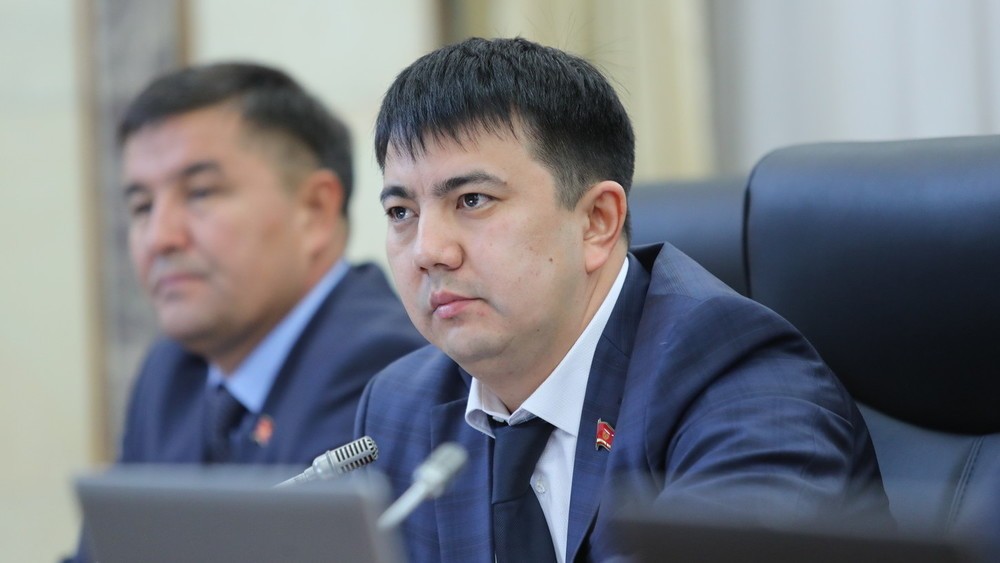
Pictured: Marlen Mamataliev.
As a result, voters came/traveled to vote on Form No. 2 at polling stations in Bishkek, which were absolutely "jammed". The law establishes a rule that the number of voters at one polling station may not exceed 2,500. Even before the election, then-CEC member Atyr Abdrakhmatova warned of the danger of disruption of the election for this reason.
Even the heads of precinct election commissions could not resist this mass phenomenon, because they could be fired if they disobeyed. A number of media outlets (https://april.kg/ru/article/uvolen-direktor-sosh-60-eto-sdelano-po-politicheskim-motivam-schitayut-kollegi, https://kaktus.media/doc/419708_za_tri_dnia_do_novogo_ychebnogo_goda_yvolilsia_direktor_shkoly_bishkeka.html) covered the situation with Malik Dairov, the principal of the capital's school No. 60, who was also the PEC chairman.
On August 27, three days before the start of the school year, the director was forced to resign. Teachers of Secondary School No. 60 wrote about that in an official letter to the Ministry of Education and Science of the Kyrgyz Republic.
The reason, told by the teachers of School No. 60, was that there was an order from the higher authorities to register "all citizens who come to the polling station."
According to the teachers, mass registration of people began afterwards, citizens from the regions were coming as well. Up to 50 people a day had to be registered. In this regard, a complaint was filed against the principal, and later it became known that he was fired.
"How long will teachers be used in the political game!", asked the educators in their official letter at the time.
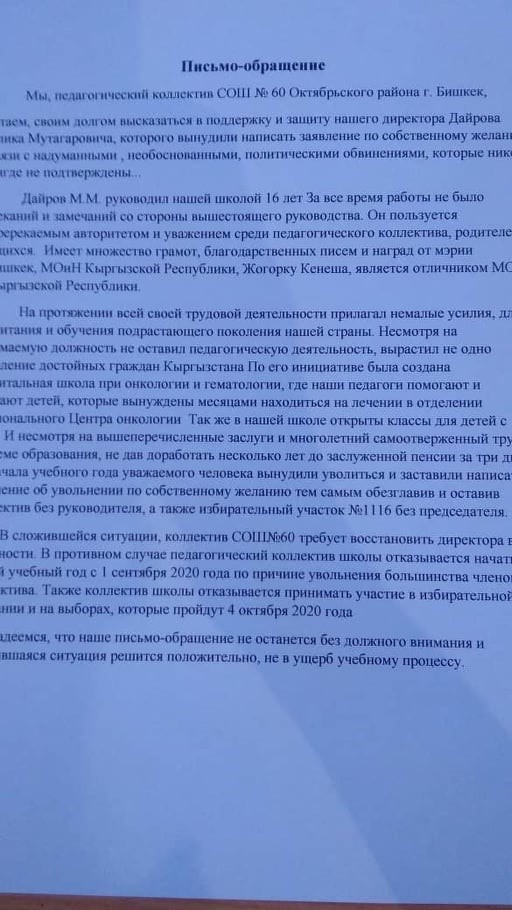
Atyr Abdrakhmatova confidently stated that the occurring phenomena and her observations prove "the possibility of using the administrative resources, vote-buying and perhaps even falsification of electoral documents".
A number of political parties appealed to the Central Election Commission, the State Committee for National Security and the Prosecutor General's Office several days before the elections: "We ask the CEC to release data on the changes in the voter lists in terms of each polling station on each day from July 26 to the present. In addition, we ask to check each case of mass inclusion of voters on Form No. 2 together with members of the CEC, law enforcement agencies, and representatives of public organizations and political parties. We ask the General Prosecutor's Office and the SCNS to check for the presence of administrative resources, vote-buying and falsification of election documents, as well as to publish the results of the checks."
In turn, the CEC sent materials on 64 cases of violation to law enforcement agencies and prosecutors. However, no action was taken.
Along with other public organizations, the Common Cause Public Foundation has also conducted independent election monitoring for compliance with national legislation and international standards for democratic elections. In its work, the Foundation relied on the articles of the constitutional law "On Elections of the President of the Kyrgyz Republic and Deputies of the Jogorku Kenesh of the Kyrgyz Republic" and provisions of the Central Election Commission for Elections and Referenda of the Kyrgyz Republic.
In the course of the monitoring, observers of the Common Cause Public Foundation prepared and sent a number of reports, statements, appeals, and complaints to the CEC, the General Prosecutor's Office, and the Ministry of Internal Affairs.
(see infographics).
Legalized bribes?
On October 18 a round table was held, at which civil activists and deputies discussed the past elections. As Kloop quoted the candidate from "Mekenim Kyrgyzstan" party, deputy Marlen Mamataliev, at this meeting he stated that the headquarters of his party paid salaries to the canvassers. "Thus, legalizing bribes," Mamataliev stressed. At a meeting of activists concerning the electoral process, Mamataliev said that they had recruited an unlimited number of agitators.
"We had 12 thousand agitators in Bishkek, they all received a salary, we paid 20-25 thousand soms for each," said the politician.
According to CEC information as of October 4, "Mekenim Kyrgyzstan" spent 116,108,485 soms in the elections. According to Mamataliev, 240 million soms were spent on the salaries of the party's canvassers in Bishkek alone. And to these expenses should be added services for the placement of banners of the party, advertising on TV channels and websites, canvassers in the regions (link to the meeting of October 18: https://www.facebook.com/watch/live/?v=1631311183708865&ref=externa).
"Some" canvassers were engaged in vote-buying," says Gulgaky Mamasalieva, director of the "Interbilim Osh" International Center. Observers from this organization saw people with voter lists at some polling stations on the day of voting; they handed out between 500 and 1,000 soms to those who voted for a certain party. "Interbilim Osh" observers recorded the instances in Osh and Jalal-Abad oblasts when voters according to the lists were given medical masks of a certain color or with some identification sign so that members of commissions would give them ballots which had already been marked in favor of the necessary party.
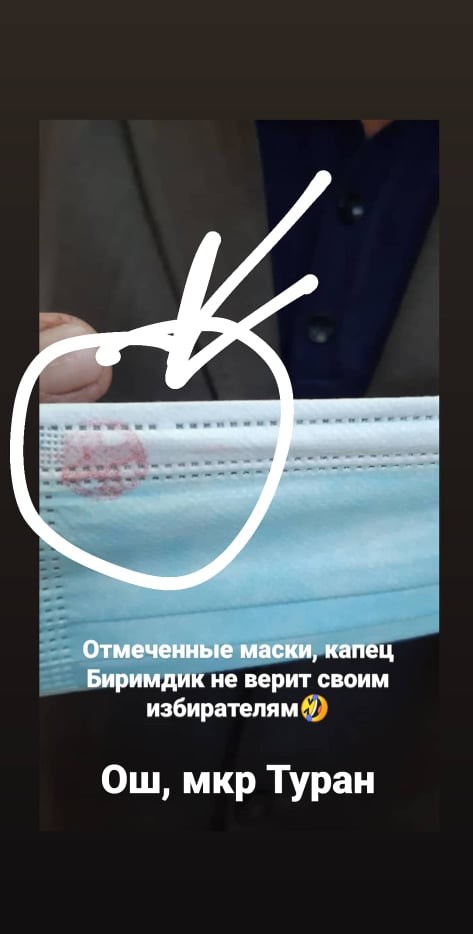
Some "canvassers" demanded a photo of the ballot paper in order to make sure that voters voted for the right party. Edir Bova, director of the "Taza Shailoo" Association, said on October 5 that there were many attempts to photograph the ballots. Such cases were recorded in Jalal-Abad, Talas, and Bishkek.
Vote buying and the use of administrative resources have been a problem since the country's independence. "Despite the changes made to the codes on violations and offenses, these things have not been eradicated," admitted Abdyjapar Bekmatov, deputy head of the CEC, on air of "Birinchi Radio" on November 16. A. Bekmatov suggested that if the irregularities in the parliamentary elections are addressed after a thorough study of materials, there will be much less of them in the upcoming elections.
"In addition, there is an administrative resource. Voters are brought in by buses, teachers or medics are forced to vote for somebody... We need to take measures to reduce the number of such cases," said A. Bekmatov.
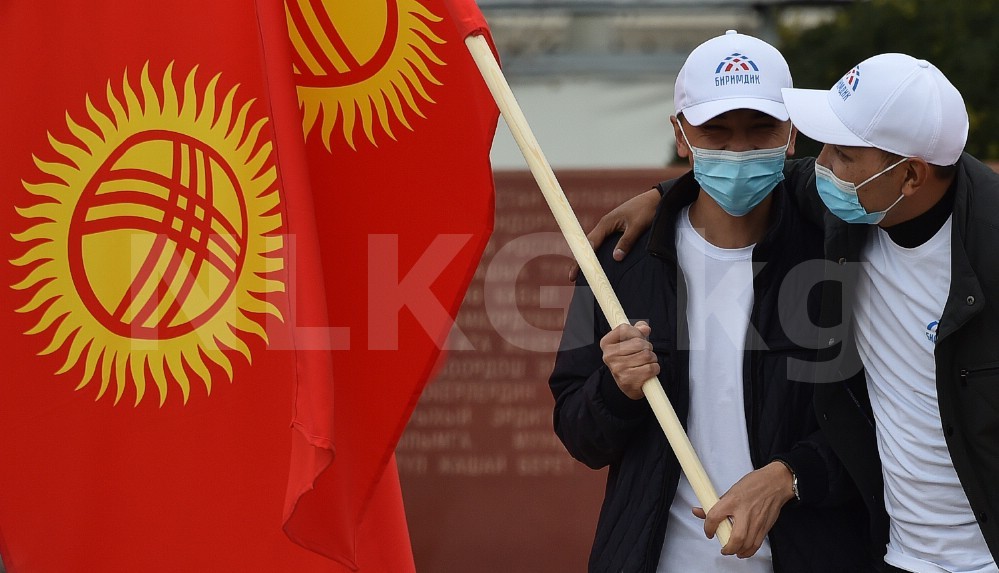
Manipulation within parties
No lesser violations reigned within political parties. Not only were most of them done just two or three months before the election, but in order to get into the top ten candidates, one had to pay an immense amount of money.
"To be at the top of the list, some gave $500,000, one million dollars each," said candidate Marlen Mamataliev.
Furthermore, there is a tacit political strategy in many parties - they take wellknown celebrities (artists, civic activists, journalists) as front-runners, and after the elections they force them to give up their seats, so that the right candidates or moneyed candidates take their place. Such was the situation with former Deputy Prime Minister Aida Ismailova in the 2015 elections. She was a candidate from the "Respublika" party. And after the party won the elections, many candidates were tried to be squeezed out of the list. A. Ismailova, like other deputies, even had to sue the party.
The guilty parties are not punished
On October 5, 2020, after the announcement of the preliminary election results, according to which only four parties won the parliament, including three pro-government parties by a wide margin and the Butun Kyrgyzstan Party, which barely gained the cherished 7%, the mass meeting began. As many as 10,000 Kyrgyzstanis who disagreed with the results of the preliminary elections gathered on the square. However, due to the incitement by a group of young people, the law enforcement bodies began to disperse the rally. As a result, the protesters clashed with police officers. By the morning of October 6, protesters had seized the building of the Jogorku Kenesh of the Kyrgyz Republic, which in Bishkek means that the government has fallen. On the same day, the CEC annulled the election results.
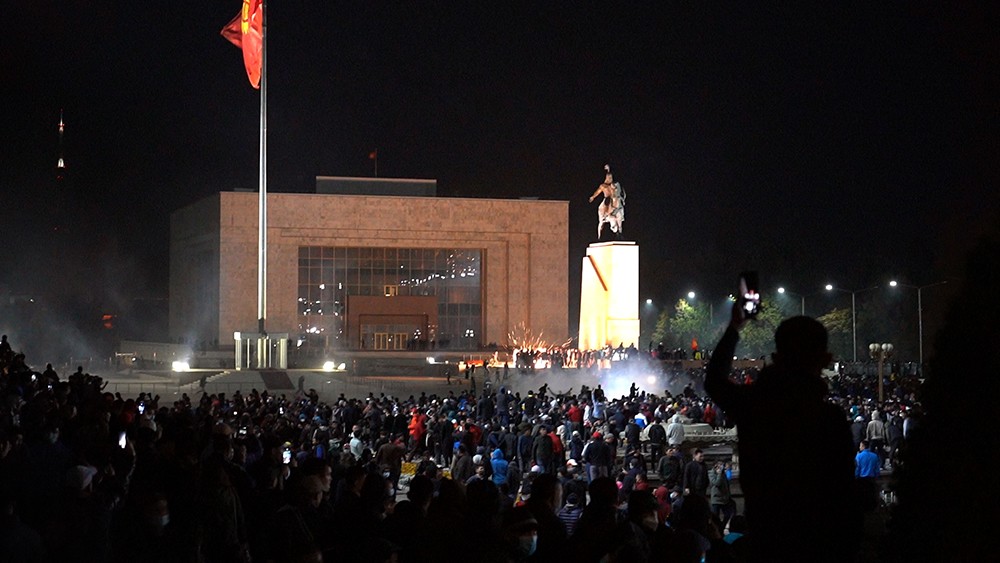
A 19-year-old boy died as a result of the clashes, and more than a thousand Kyrgyz citizens were injured.
Further events developed most rapidly. Politician Sadyr Zhaparov, who had been imprisoned for the attempted seizure of power and hostage-taking, who then had been released from the prison, came to power. His supporters forced President Sooronbay Jeenbekov to resign by force and threats.
Logically, since the election results were annulled, the CEC should have called a new election. But events followed a completely different scenario.
According to lawyer Atyr Abdrakhmatova, the constitutional law clearly states that if elections were invalid or failed, the CEC shall call new elections within a month.
"The CEC decided to cancel the voting results not because of violations committed by the winning parties, but because of the socio-political situation in the country. The law clearly states that if the actions of political parties and candidates led to election irregularities and the elections were declared invalid or failed, these candidates have no right to run in a repeat election. I insisted on the CEC making a decision on the basis of massive irregularities. That we establish the involved parties and candidates. I either suggested that the CEC should admit their guilt, in which case we would have to leave so that new members can come in. But, unfortunately, by a majority of votes, the decision was made on the basis of socio-political situation,” says Atyr Abdrakhmatov.
However, CEC member Kairat Osmonaliev argues that the CEC made its decision on broader grounds. “This included several reasons, including what Atyr Abdrakhmatova wrote about. Yet, what she says is only one aspect of it. When it comes to dishonest participants of the electoral process, we should talk not only about the parties, but also about the other side - the people who sold their votes in a shameless way; I call them people of lower social and political responsibility," explains K. Osmonaliev.
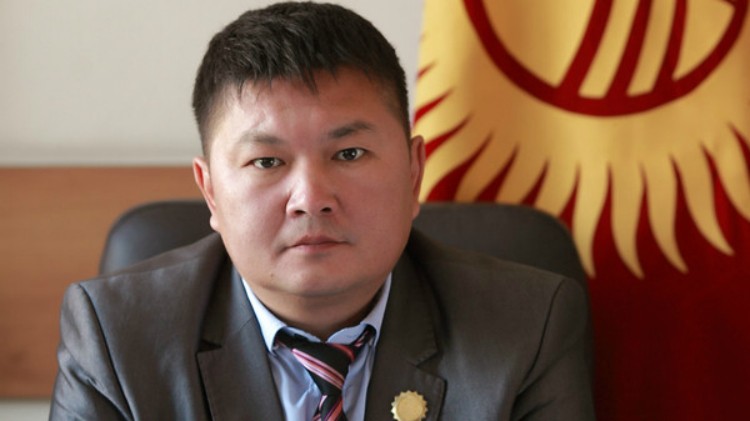
Pictured: Kairat Osmonaliev, CEC member
According to K. Osmonaliev, there was no detailed analysis of the situation at that time, as there was a danger of conflict escalation on October 6, 2020. “By this time, the building of the Jogorku Kenesh of the Kyrgyz Republic had been vandalized and set on fire. There was information that certain groups planned to come to the CEC and do the same thing. We didn't have a single police officer, just three guys from the security agency and some courageous women. Therefore, the decision rendered was more political, as there was an extreme need at the time, to prevent the worst danger," concludes CEC member K. Osmonaliev.
According to the results of the nonpartisan observation of parliamentary elections conducted by the Common Cause Public Foundation, it was concluded that the main violations of the parliamentary elections were vote-buying, indirectly confirmed by the mass use of Form No. 2, and the abuse of administrative resources.
In order to eliminate such violations in the future, the Public Foundation recommends law enforcement agencies to strengthen their efforts to prevent such cases and to review the complaints and petitions they receive. Liability should be established for violating the deadlines set for reviewing complaints and petitions.
On October 8, 2020, the General Prosecutor's Office of the Kyrgyz Republic registered the collected materials on the above mentioned facts of numerous violations during the elections of deputies to Jogorku Kenesh of the Kyrgyz Republic in the Unified Register of Crimes and Misdemeanors on the grounds of the crime under Part 1, Article 331 "Negligence" of the CC of KR, and the pre-trial investigation was assigned to the Ministry of Internal Affairs under Article 33 of the CC. The investigation is still ongoing.
The CEC scheduled the election for December 20, 2020, but the CEC decision was overturned by the court in the end.
So far, the parties and candidates responsible for the violations have not been named, and the public has been dragged into the process of discussing the amendments to the legislation; everyone has engaged in the discussion. According to independent lawyers from the Civic Control Committee, Sadyr Japarov, the acting president, had no right to initiate early presidential election and to start a constitutional reform, in which he plans to change the form of government in Kyrgyzstan by strengthening the institution of the presidency and introducing single-seat elections in addition to the elections on a party list basis. He was supposed to hold new parliamentary elections under the old Constitution, not blatantly violate the constitutional election law.
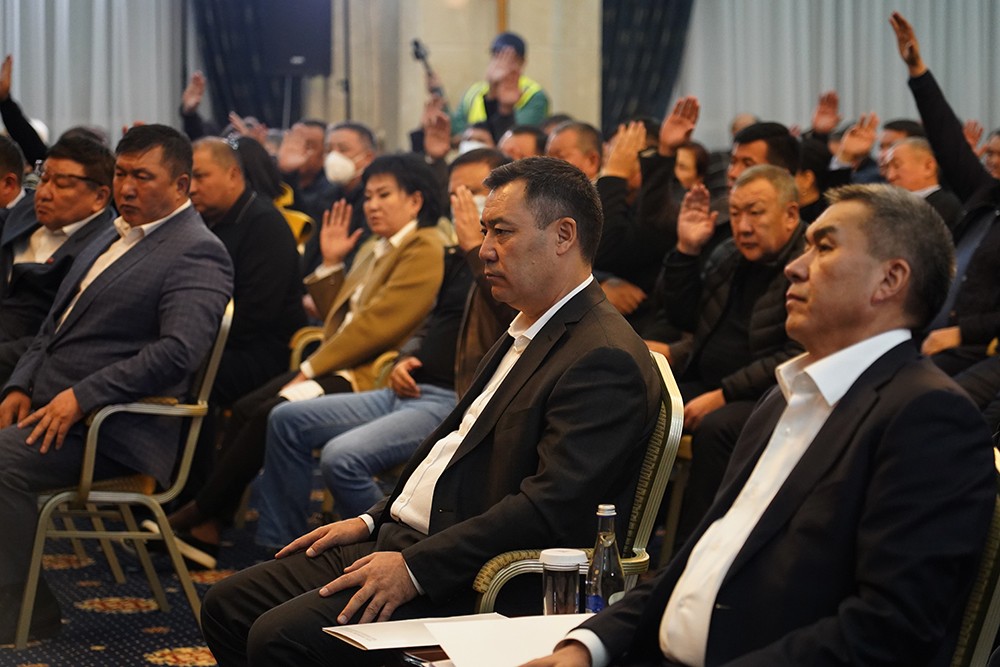
Pictured: Sadyr Zhaparov is in the center during the voting of the deputies of the JK KR.
Fighting with no rules, for power
According to experts, the events of October 2020 may be meaningless if the parties and politicians who committed numerous election violations are not named.
Political scientist Sheradil Baktygulov believes that these events cannot be called a revolution. "It was a disagreement by citizens with the outcome of the vote, with the way they were treated. It's another matter that others have taken advantage of it. People wanted a cleansing, a renewal," says the political scientist.
For her part, Elmira Nogoibaeva, a political scientist, believes that the further political struggle will be even more fierce.
"For one simple reason - people are struggling for capital. Not financial, but political. In our country, political capital plays a much more important role than financial capital. This is because, with political capital, one can appoint people to offices, push large formal or informal projects. With political capital, it is much easier to start, run and promote your business. That's why the oligarchs, the businessmen - all people who have financial capital, especially informal capital, are in need of political capital. Also, people who need immunity go to parliament. Not just individuals, but entire families go there for this purpose," Nogoibaeva says.
Thus, the oligarchic forces vying for power understand that if elections are held in the near future, there is no way they can get into parliament. That's why the deputies of the sixth convocation, 75% of whom rushed to the new convocation from pro-governmental parties, supported a new bill suspending two articles of the constitutional law, extended their terms of office for 8 months and postponed the parliamentary elections to a later date. They are also likely to support any proposal to change the Constitution, just to stay in power.
The "Novye Litsa" publication would like to thank the Common Cause Public Foundation for its assistance in preparing this material, as well as all the experts who shared their opinions, because they care about the future of our country.
Leila Saralaeva
Photo credits: Vyacheslava Oseledko and Abylai Saralaev









